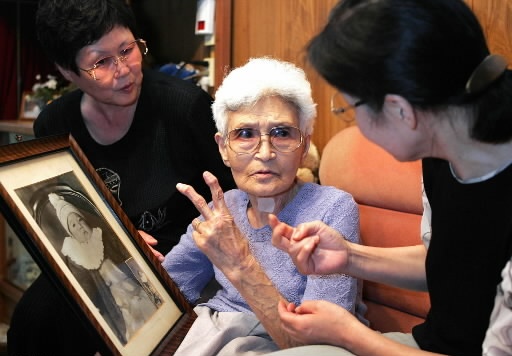The Silent Blast: The Atomic Bombing and the Deaf, Part 2
Jul. 1, 2010
A mother's grief lingers
by Yoko Kinomoto and Kenichiro Nozaki, Staff Writers
The atomic bomb wrought unprecedented destruction 60 years ago. [This series was first published in July 2005.] But some of the residents of Hiroshima were unable to hear the tremendous blast. The bewildering devastation of the bombing was silently scored into the memories of deaf survivors. These survivors have lived their post-war days under a cloud of frustration, incapable of conveying verbally what they experienced. According to a group which recognizes the deaf victims of the atomic bomb, about 140 deaf people were exposed to the blast, but less than 50 are still alive today. The Chugoku Shimbun interviewed five deaf survivors through sign language interpreters to trace what they experienced on August 6, 1945 and in the bombing's aftermath.
Kirino Matsushita, 83, a resident of Asaminami Ward, Hiroshima
"My daughter was crying." Kirino Matsushita knew this from the way her daughter, Miyoko, was squirming on her back. Miyoko was bawling, but Ms. Matsushita could not turn around. They were exposed to the bomb's heat rays in front of Hiroshima Station, 1.9 kilometers from the hypocenter, and she was badly burned on the left side of her body, from her neck, shoulder, and arm down to her leg.
Ms. Matsushita ran and ran to her parents' house in Minami Ward, Hiroshima. When she took her daughter down from her back, Miyoko looked like a different person. Her face was red and swollen, her hair and eyebrows were charred. Her eyes then opened to slits and her body shook in a violent convulsion.
Ms. Matsushita is reluctant to relate Miyoko's last moments, her first child who died at the age of 2. "I forgot. I already forgot," she explained. But when she shared her memories of Miyoko while the little girl was alive, her hands moved smoothly as they signed. Ms. Matsushita said that people were surprised how quickly Miyoko began to speak, and how well she toddled around wearing rain clogs meant for adults.
It was Miyoko's job to tell her deaf mother when an air-raid warning sounded. Miyoko would run to her, pat her on the shoulder, and point to her mother's air-raid hood to urge her to put it on. In the aging mother's mind is her beloved daughter, still 2 years old, with plump cheeks and bobbed hair.
"I wanted my husband to see Miyoko walk," she said. It was on the early morning of August 6, 60 years ago, that Ms. Matsushita left her home in Naka Ward, Hiroshima to take her daughter to see her husband, who was hospitalized in the city of Kurashiki in Okayama Prefecture. He had been injured in a bombing while dismantling a military building in the area and was admitted to the local naval hospital.
When her husband, who was a carpenter and also deaf, left Hiroshima, Miyoko had just started crawling. "If he could see how much Miyoko has grown, now walking around, he would be so impressed," she thought. The day before, she had even splurged by taking Miyoko to a hairdresser.
That morning, she was carrying Miyoko on her back and had strapped extra clothes and a water bottle to her body. She got off the street car in front of Hiroshima Station and took a few steps.
A red light flashed right before her eyes and she was blown into the air by the blast. A white cloud boiled up into the sky, blinding her field of vision. Her body felt hot. Then, little by little, she was able to see her surroundings again. The street car she had just stepped from was badly twisted. She saw wreckage and people who were struggling to move. When she finally reached her parents' house, her father didn't recognize her at first. He finally identified her from the pattern on the clothes she was wearing.
At that point in the interview, Ms. Matsushita fluent signing came to a halt. Her face showed little expression and she conveyed to us, "My daughter passed away two days later." Ms. Matsushita herself was ill in bed and could not hold Miyoko when she died.
After the war, she gave birth to two daughters. Mitsuru, 58, her second daughter, and Nobuko, 55, her third daughter, believe, "Mother struggled to raise us. She made extra efforts because of her deafness." Ms. Matsushita helped support the family by sewing kimonos and she made dresses for her daughters.
From time to time, Ms. Matsushita would break into tears at her memories of Miyoko. At one point she even made a gesture of wanting to hang herself to convey to her daughters her desire to commit suicide. Her daughters said, "We could do nothing but cry with her. Neither we, nor our late father, could do much to ease her sorrow."
Ms. Matsushita rubbed her keloid which spreads from her neck to her shoulder. At the same time, she patted a photo of Miyoko. These were the hands with which she worked doggedly to endure the postwar days. "We must not forget," she appealed resolutely. "No wars. No nuclear weapons."
(Sign language interpreter: Hiroko Kunichika)
(Originally published on July 18, 2005)








